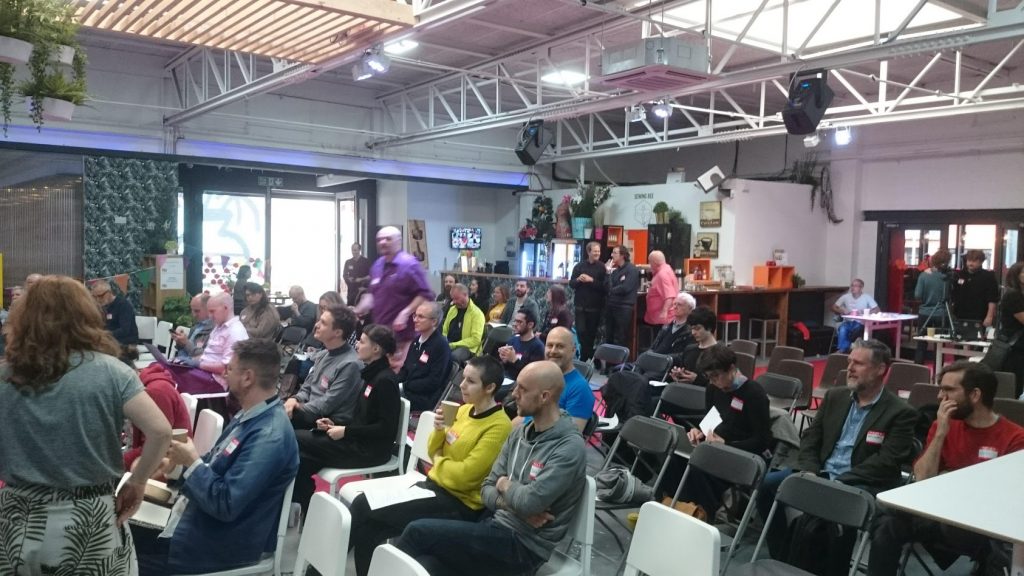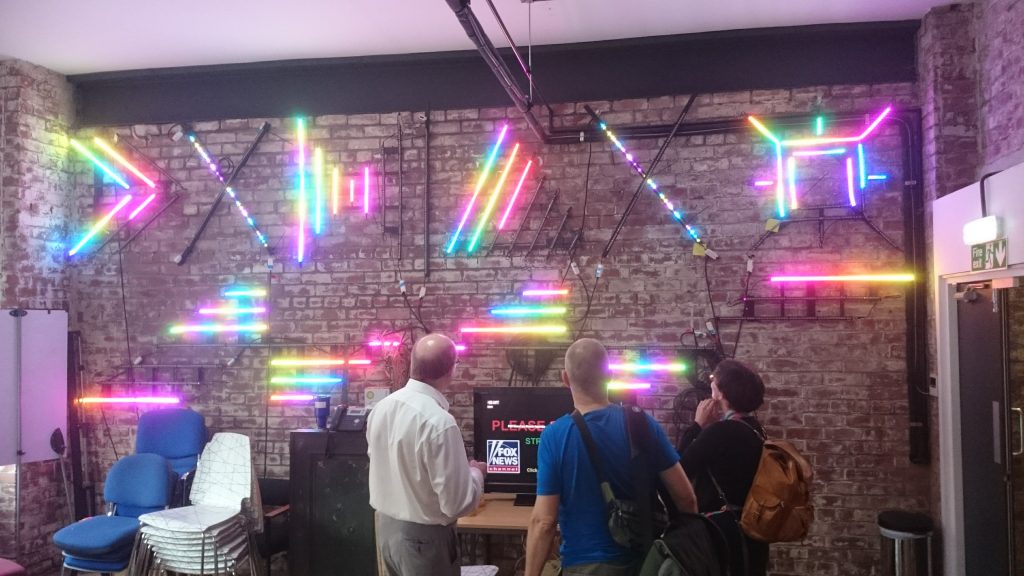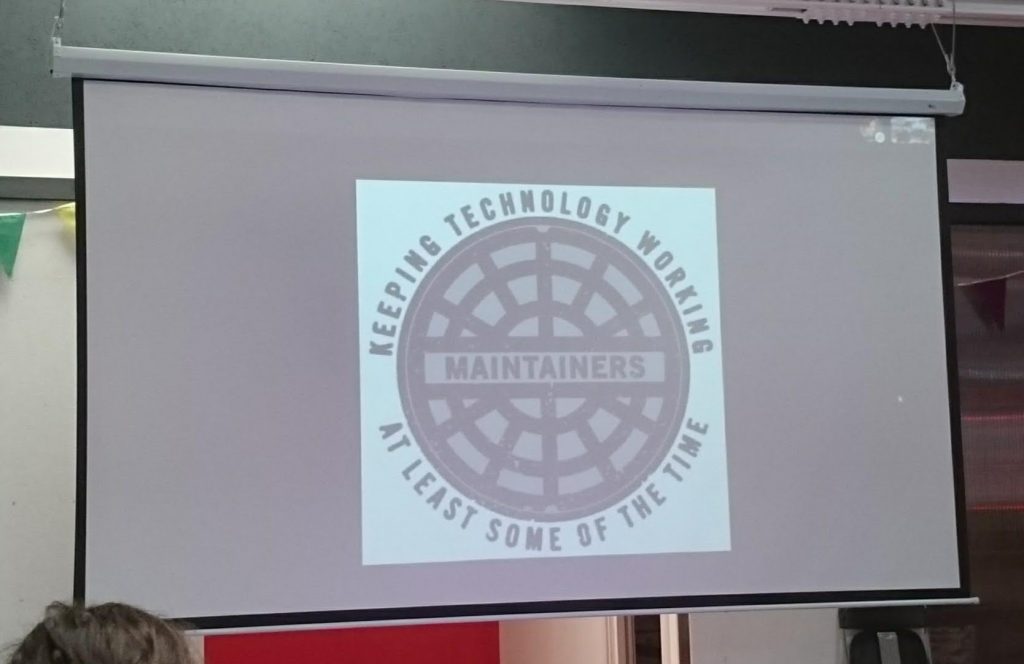On my way to Amsterdam for day two of IndieWebCamp, that I’m co-hosting with Frank. Today’s focus will be on doing, based on the conversations and ideas we had yesterday. I’ve published a few pics on Flickr.
IndieWebCamp Lunch
The IndieWebCamp Amsterdam bunch at lunch
I have three ideas I migh…
Author: Neil Mather
Yesterday was the Festival of Maintenance in Liverpool. I went along and thoroughly enjoyed it. Lots of interesting talks and nice people. The theme was basically the maintenance of things, sometimes purely engineering-focused (e.g. bridges and potholes and data), and sometimes with a pretty lefty alternative economics, post-growth, social care focused thread running through it too.
It was at The Fashion Hub, a really awesome space in the old fashion district of Liverpool, with the excellent DoES makerspace just upstairs.
It was chock full of interesting things. I have loads of notes that I hope to digest and probably microblog about over the coming days, but a quick note of a few themes that formed for me:
education
Students need to learn more about maintenance and repair, not just how to make new things. Tom of Holland mentioned how textile repair used to be in most textbooks, but no more. Civil engineer Mujib Rahman mentioned how students come into university wanting to know how to build things, and with less interest on how to maintain things.
maintenance as care
I’ve thought before how social care can be kind of be seen as a form of maintenance in a fairly abstract sense. But I liked the point made by Juliet Davis about how maintaining something for someone can be seen as an act of care for the person, too.
patterns of maintenance
Common themes seemed to arise throughout the day – e.g. the importance of monitoring in maintenance. Chris Adams mentioned during the panel discussion that a pattern language of maintenance could be a useful resource – I agree. The ODI have just released their pattern catalogue of collaborative data maintenance, but there could be scope for a general pattern catalogue of maintenance techniques and considerations.
The Open Data Institute has just launched a guidebook on collaborative data maintenance. They’ve built a patterns catalogue from looking at various collaborative data projects, looks pretty handy.
https://theodi.org/article/launching-the-collaborative-data-maintenance-guidebook/
Reading the chapter ‘Technological Utopianism Is Dangerous’ in Future Histories.
Technological utopianism ‘sees technological progress as the means to bring about a perfect society.’
On Utopianism: ‘a map of the word that does not include Utopia is not worth even glancing at’
but: ‘Utopianism can abridge our capacity to imagine what true emancipation might look like’
kobakant has a load of cool and nicely documented e-textiles projects, like DIY data gloves and an interactive alpaca t-shirt
Unless you use a part provided by Apple, and a repairer certified by them, you’ll get a warning about your replacement screen.
"More broadly, this restriction is the kind of gradual progression toward repair fear and uncertainty we were afraid we’d see after Apple’s independent repair program announcement. It allows Apple to further restrict the repair market to those who buy their parts and sign up for their certification."
https://www.ifixit.com/News/apple-is-discouraging-screen-repair-with-an-iphone-11-genuine-warning
I get a message at emacs startup telling me that:
> Package html2text is obsolete!
It’s because I have an old version of mu and mu4e (https://emacs.stackexchange.com/questions/42343/package-html2text-is-obsolete). I’m on 0.9.18, which is the version that is in the Ubuntu 18.04 repos (https://launchpad.net/ubuntu/+source/maildir-utils), and hence what Mint 19.2 has. There doesn’t seem to be a PPA with a newer version.
It’s possibly an argument against using Mint for my personal desktop. I don’t need the stability that a server or office machine might need. I like Mint, I think it does a number of things well, but I may switch to Debian again for rolling releases (for example, in Debian Bullseye, mu4e is on 1.2.0 (https://packages.debian.org/testing/lisp/mu4es.debian.org/testing/lisp/mu4e)).
#IndieWebCamp Amsterdam this weekend!
Sat 28/9 unconference sessions on all things #IndieWeb
Sun 29/9 building your own next step on the IndieWeb.
Register and get more info at https://indieweb.org/2019/Amsterdam
Should be in London so can hopefully swing by!
I’ve been reading through the first chapter of The Little Schemer, and following along in Emacs (specifically: spacemacs).
I jotted down a few notes on getting set up to do this.
First off you’ll need to install a Scheme implementation. There’s a few of them out there. This Reddit thread has some useful discussion on the pros and cons of each of them.
As I’m on Linux and using Emacs, I went with Guile.
To install on Linux Mint, you just need:
sudo apt install guile-2.2At this point, you could simply fire up Guile and work within the REPL there, if you wanted.
I want to write my Scheme in Emacs, and then send it to the REPL from there. The preferred Emacs package for that seems to be geiser. In spacemacs, geiser comes included with the scheme layer, so all you need to do is add that layer into your config and you’ve got geiser (and some other handy scheme bits and pieces).
Once you’re in a scheme file, run M-x run-geiser, choose guile from the dropdown, and that’ll start up the Guile REPL and allow you to send parts of your file to it for evaluation. C-x C-e for example will send the sexp before the cursor.




